SAINT CHARLES DE FOUCAULD
11. Lost in the Hoggar (1904-1908)
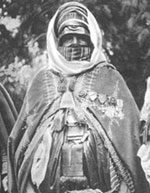
WE left Father de Foucauld on an « expeditionary » tour in the Hoggar, in company with Captain Dinaux. This officer, who was keen to continue the work of Laperrine, met Moussa ag Amastane and sixteen of his notables. On the 23rd June 1905, the grand aménokal of the Hoggar made amends for his attitude over the last two years and, as a sign of submission to France, agreed to pay the tax. In addition, he offered to accompany the captain on his expedition, which resumed on the following 10th of July.
The mission continued southwards, therefore. They talked about the benefits of peace, the end of brigandage : France will now support Moussa and help to collect the taxes from his subjects as well as create the unity of his kingdom by quelling the rebellious tribes.
Moussa also offered to install the « Christian-marabout-servant-of-the-one God » on his territory and to take him under his protection. Dinaux hesitated to leave his friend all alone, hundreds of miles away from any European, at the heart of a region which only yesterday was fiercely hostile to the French. But Father de Foucauld insisted on staying at Tamanrasset, where they arrived on the 13th August 1905. What courage !
TAMANRASSET.
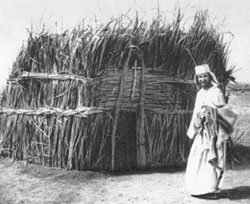
On the 4th September 1905, his friends of the mission left him, and he remained alone, with Paul, in the midst of an unknown people. Here and there, the tents of the nomads made this desolate place one of the crossroads of the Hoggar. He describes his situation, in September 1905, in his letters to Madame de Bondy.
« Tomorrow morning, the French detachment is leaving here. I shall be well settled : from the sale of my camels I can have a clean house built with stones and earth ; and a reed hut ; I shall be able to dig a little well and to clear the garden... Don’t worry : we, you and I, are in the hands of the Beloved... It is better for us to have Him than all the soldiers in the world... and if your child were to share the fate of our great-great uncle Armand [Vicar general of Arles, massacred in the garden of the Carmelites during the Revolution, on the 2nd September 1792], wouldn’t you be happy at that ? Jesus said that that was the greatest sign of love ; wouldn’t you be happy to see your child give that sign ?... I don’t think it will come to that, however : non sum dignus... The country is considered to be very quiet ; I am delighted with this opinion which I shall take care not to contradict ; in my opinion, it is in fact quiet, but there can still be from time to time agitation here and there [...]. I shall remain alone, happy, very happy to be with Jesus alone, alone for Jesus. » (3 September, in Lettres à Madame de Bondy, p. 144)
And a few days later :
« I am very pleased with myself for having settled in this country and in this particular corner of the country ; there are very few fixed inhabitants, twenty or so poor huts scattered over an area of three kilometres, but there are many nomads round about ; it is the heart of the country’s strongest nomadic tribe ; the nomads and a few settled people have already made a habit of coming to see me to ask for needles, medicine, and from time to time the poor come to beg a little corn...
I am overwhelmed with work, hoping to finish as soon as possible a Touareg-French and French-Touareg dictionary. As I am obliged to interrupt this work at every hour to see to the natives or have little jobs done, it is not getting on very fast... I do very little manual work, which I would so much like to do... But as well as being a monk, I am priest, sacristan and missionary, and it is more than necessary at the moment that I provide the elements for learning this people’s language... I yearn to be finished with this work of writing so that I can take up the tools of Jesus and Joseph. » (16 September, in Georges Gorrée’s “ Sur les traces du Père de Foucauld ”, Paris, 1947, p. 209-210)
He celebrated Mass for the first time on the 7th September in the “ frigate ”, a sort of dark passageway built for him by the soldiers before they left. He asked his usual correspondents to place ex-votos in several churches to mark the event and as an act of thanksgiving to God. This is the fulfilment of his vocation ; this is where he wants to lead the life of Nazareth. In the most absolute solitude, in perpetual danger, abjection, surrounded by savagery.
He will remain for nine months in this first stay, eighteen in the second, and twenty-seven in the third, that is just over two years in the most appalling solitude. He is a month’s camel ride from the nearest Frenchman... and the mail comes only once a month. The nomads themselves come and go depending on climatic conditions.
« I try to do the will of Jesus from day to day, and I am in the greatest interior peace. Do not torment yourself at seeing me alone, without a friend or any spiritual help : in no way do I suffer from this solitude ; I find it very pleasant. I have the Blessed Sacrament, the best of friends, to talk to day and night. I have the Blessed Virgin and Saint Joseph, I have all the saints, I am happy and want for nothing. All the time left from prayer, looking after the sick and receiving a few visits from poor people who come to see me, is spent on this work of the Touareg language : I have enough work for another six months before finishing it. In the autumn I had quite a few visits from the natives, but now I have very few : even though the cold is very slight, it keeps them in their tents, for the people are so lightly clothed and ill fed, that they feel the cold intensely. » (16 December 1905, to Marie de Bondy, ibid., p. 212-213)
He is constantly reassuring his family, but he knows very well that although Moussa can guarantee his safety as much as he likes, there is nothing he can do against his enemies supported by the Senoussistes : Attici, for example, Moussa’s personal enemy, ready to take his revenge on the French for having beaten him at Tit on the 7th May 1902.
He lives among the very last of men : the black slaves who make up the majority of the population of Tamanrasset.
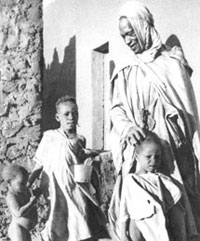
« As for the slaves who can still work, they are abandoned there like animals ; they keep their flocks and they couple haphazardly, just as their animals do. All the children born are of an unknown father ; they live abandoned and will soon have forgotten their mother ! »
As for their women, « when they are old, their masters free them, and then they have nothing to fall back on at all ; no husband, no family. They live with the goats. »
And the Touaregs ? They are not much better ! The women are pleased with the raids their menfolk make ; it is their only concern ! For the rest, they live freely, killing children born out of wedlock. At moments one feels that the Father is sickened – although in his charity he does not speak like that – by the crude morals of the people amongst whom he has decided to live.
« How good it is to see a Frenchman, a Christian, who, after all, has a moral life and discreet manners which just do not exist among these people ! »
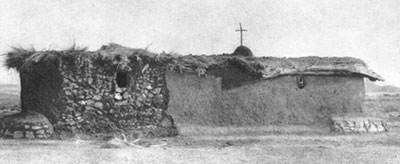
It is a mixture of savagery and of natural gifts, and Brother Charles endeavours to make that discernment with a view to their slow education. Through his influence, he will begin by making an imperceptible difference, which will become greater and greater, animated by a purely supernatural will.
« I choose this fixed, abandoned place, begging Jesus to bless this establishment, where I wish to take the example of the life of Nazareth for my life. To settle among the Touaregs, and as far as possible at the heart of the country. To let the Muslims see the Cross and the Sacred Heart. To establish friendship, the friendship of Jesus, whose emblem is a Heart. » (Diary, 22 July 1903).
We know how much importance he attached to example and to silent influence : was not he himself converted by seeing the faith of his cousin Marie de Bondy and her love of God ? Every time he saw her, it did him good. His objective now will be to show, not his own person, but the Sacred Heart surmounted by the Cross, which he proudly wears on his chest.
In imitation of Our Lord, he becomes the servant of all :
« To live in the country is good ; there is action even without doing very much because one becomes a part of the country ; one is approachable and so little. »
That is truly his ideal ! He exercises his charity, distributing provisions, little gifts and attentions. And, above all, he keeps smiling :
« I laugh all the time, I show my bad teeth ; this laugh puts one’s neighbour, the person being spoken to, in a good humour ; it brings people together, allows them to understand each other better ; sometimes it brightens up a gloomy character ; it is charity. » (letter to Dr. Hérisson, a Protestant).
What a life of sacrifice, what deprivation ! But God’s good pleasure demands still more of him, and he will readily conform.
EFFACEMENT.
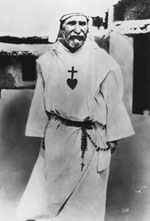 Paul left him on the 17th May 1906. Lazy, slow and stupid, his behaviour had become so deplorable that the Father had to send him away. Fortunately, his friend Motylinski, an interpreter in both Arabic and Berber, arrived to teach him the Touareg dialect, then they left for a grand tour. The Father returned to Beni-Abbès : the inhabitants showed him their joy at seeing him again. He was touched by this and saw this beginning of an attachment to himself as an attachment to Jesus. We are at the beginning of November 1906 : he also received a visit from Lyautey.
Paul left him on the 17th May 1906. Lazy, slow and stupid, his behaviour had become so deplorable that the Father had to send him away. Fortunately, his friend Motylinski, an interpreter in both Arabic and Berber, arrived to teach him the Touareg dialect, then they left for a grand tour. The Father returned to Beni-Abbès : the inhabitants showed him their joy at seeing him again. He was touched by this and saw this beginning of an attachment to himself as an attachment to Jesus. We are at the beginning of November 1906 : he also received a visit from Lyautey.
It is then that a magnificent hope dawned for him : the White Fathers are going to give him a companion. He is a former zouave, a young Breton aged twenty-three, with a vocation : Brother Michel. He goes up to Algiers to fetch him, and together they leave. Christmas at Beni-Abbès : joy for the inhabitants. Then Adrar where Laperrine is stationed, In-Salah where they stay for a month, whilst the Father works on his dictionary. On the 1st February, he bought a little house to make into a chapel. But when it was time to be on their way, Brother Michel, feeling sick and exhausted, abandoned him. On the 6th March, the Father sent him to see Bishop Guérin, « not so much because of his physical weakness as for his great weakness of soul. » He went on, however, to make his profession with the Carthusians of La Valsainte in Switzerland, where he remained faithful till his death.
With Captain Dinaux and his assistant, Lieutenant Sigonney, Father de Foucauld went down to Tamanrasset again, where he arrived on the 6th July. He stayed there for eighteen months. This time, he noticed that the Touaregs showed more confidence in him, instead of the distrust he had encountered during his first stay, and that gladdened him. But he remained alone, and difficulties rained down on him.
Without a server for Mass, he could no longer celebrate :
« I have the Blessed Sacrament, however, and I renew the Sacred Species when Christians pass through, allowing me to say Holy Mass. The Most Blessed Sacrament and solitude are treasures I savour more and more [...].
« I yearn for and need much longer time for prayer and reading ; I also yearn for the Sacraments and for the Mass. It will come in due time, when Jesus wills : I believe that I am in His will... My presence here is apparently of very little good ; but I have faith that the presence of the Divine Master in the tabernacle in reality does much more good. » (22 Nov. 1907, Correspondance avec l’abbé Huvelin, p. 274-275)
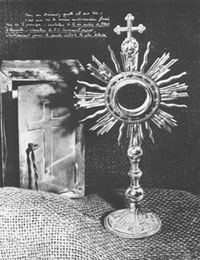
« The great good that I do is that my presence here procures that of the Most Blessed Sacrament ; it is impossible that Jesus should be bodily in this place without radiating His influence, without His sacramental presence being a source of grace. Then, there is at least one soul between El Goléa and Timbuktu who worships and prays to Jesus. » (Letter to Raymond de Blic, 9 December 1907)
We read in his diary this poignant refrain :
« No Mass, for I am alone... »
No letters either ! for more than two months... Six months pass without seeing a Frenchman, a Christian. Famine arrives, as a result of seventeen months’ drought, and he sees the ravages it causes, especially among the little children. He distributes his own provisions.
He does learn some good news, however :
« The good God has given me a great grace : the military organisation has just been re-ordered in the extreme south of Algeria, and my friend Laperrine will now be living at In Salah... » (22 July 1907, to Madame de Bondy)
Only seven kilometres away ! In fact, that will at least enable Laperrine to come when he knows that his friend is in distress. But his greatest sadness concerns his apostolic mission : Moussa allowed Ba Hamou to persuade him to islamise the Touareg people, who were only superficially Muslim and were basically pagan or indifferent. We shall come back to this. Brother Charles was hoping to convert them one day, and he saw himself beaten to it... He wrote :
« It is a very grave move ! Until now, the Touaregs, who were hardly fervent Muslims, easily made acquaintance with us and they were becoming very friendly and open. But once they are penetrated by this very bad spirit of the Touat and Tidikelt people, very narrow, closed and full of antipathy towards us, there is no longer any hope. »
He has been pipped at the post. In other words, he is working for nothing :
« It is hard not to feel sad, seeing the excess of evil reigning everywhere, the little good there is, the enemies of the good God so enterprising and His friends so hesitant, and seeing oneself so wretched after so many graces ! One must not be sad, but look upwards towards our Beloved. He remains the Master, and, when He pleases, he can send us such a powerful grace that everything will be overturned and transformed. For this Sahara, which is eight to ten times larger than France, and which, though not very populated, is inhabited almost everywhere, there are only twelve to fifteen priests, all living at El Goléa or at Ouargla. »
He sees a project for a Koranic school and a mosque coming to birth !
That contributed to sapping, not his courage, but his physical strength. In January 1908, his health suddenly and totally broke down. He was obliged to interrupt all his work and to remain absolutely immobile (cf. Gorrée, “ Sur les traces... ”, p. 232). He complained of his poor worn out heart. Was this a return of the tuberculosis that had already affected him at Akbès ? Or was it heart trouble ? His eyesight especially deteriorated. It turned out to be scurvy. Nothing green or fresh to eat. He wrote to Marie de Bondy : « I thought it was the end. » (ibid.)
Everyone thought so. It was then that he wrote an admirable meditation, dated the 15th January 1908 : he will soon be fifty, having made his great sacrifice years ago to the day. Brother Charles felt that he was going to die in the midst of these people who will now give themselves up to islamisation without restraint :
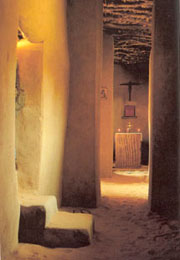
« The means used by Jesus, in the Crib, at Nazareth and on the Cross are : poverty, abjection, humiliation, abandonment, persecution, suffering, the cross. These are our weapons, those of the divine Spouse, who asks us to allow Him to live His life in us, He, the only Lover, the only Spouse, the only Saviour and also the only Wisdom and the only Truth. We shall not find better than Him, and He has not aged. Let us follow this Unique Model, and we can be sure of doing much good, for then it is not we who live, but He who lives in us. Our actions are no longer ours, human and wretched, but His, divinely effective. » (Letter to Bishop Guérin, quoted by Six, “ Itinéraire spirituel de Charles de Foucauld ”, p. 333)
It is the summit of heroism amid the greatest abandonment. God had to let Him pass through this dereliction, our Father explains, so that these words be not just literature but the summary of a life. Thus Father de Foucauld is an incarnation of Christ for our 20th century, the Gospel preached to the poor of the Sahara and to our mad, rebellious and apostate century, which will bring it back to God through the example and word of those who will be true disciples of Charles de Jésus.
Suddenly, an excess of trouble produces a return to the good : the Touaregs are worried about the marabout’s health, and Moussa sends him some goats. But, above all, the news brought to him by Laperrine on the 31st January 1908, fills him with a purely supernatural joy : Saint Pius X granted him permission to celebrate Mass alone ! « Deo gratias, Deo gratias, Deo gratias ! My God, how good You are ! Today I have received a letter from Laperrine telling me that the Pope has granted me authorisation to celebrate Mass absolutely alone without server or anyone present. It is at the request of the White Fathers that I have received this great favour. Tomorrow, therefore, I can celebrate Mass. Noël ! Noël ! Thank You, my God ! » (“ Carnets de Tamanrasset, 1905-1916 ”, published by Nouvelle Cité, Paris, 1986, p. 87)
On the 1st February, he celebrated Holy Mass alone for the first time, and with a piety we can only guess at !
Another piece of good news : the enforced islamisation advocated by Moussa for his subjects came to an abrupt end. The failure of the cadi whom he had appointed for this task was total. The Father wrote in June 1908 :
« The Beloved has turned Moussa’s efforts to organise the Hoggar into a regular and fervent Muslim kingdom to the good of souls. His efforts have failed pitifully and totally. Not only failed, but produced the opposite effect : he appointed a cadi and entrusted him with important sums of money for the building of a mosque and a zaouia, and had a religious tithe levied in the whole of the Hoggar. In three months his cadi made himself hated by everyone ; he squandered all the money he had been entrusted with and nothing was built.
« Levying the tithe displeased everyone to such an extent that all that is left of it now is the memory of an unpleasant adventure and a horror of cadis and of the tithe. Let us pray and do penance. » (Bazin, “ Charles de Foucauld ”, 1921 edition, p. 357, 1959 edition, p. 305)
There was no mistaking the difference between the Good God’s envoy and that of Mohammed !
Moussa then regained a little good sense and his confidence returned. But Father de Foucauld felt himself getting old.
On the 15th September 1908, he reached his fiftieth birthday. He wrote to Marie de Bondy on the 20th September, allowing his pen to record his secret thoughts, his missionary desires for the new and last stage of his life :
« I am all right, but I feel that I am getting old : my work is getting slower and slower : it is the work of a tired man... I feel it, and would so much like to have others with me who will naturally take my place when I disappear for good. Solitude is very agreeable to me personally ; but how many things could be done if I were not alone ! I suffer to see souls being lost and the Reign of Jesus not being extended for want of workers, because, if the workers wanted to, there is a lot of good they could do even now. I am ashamed for our country to see the little it does. Not that it does nothing, but it does so much less than it could and should do ! I don’t know whether I shall go to Algiers to talk about all this with the Superior General of the White Fathers, and perhaps to Paris to talk it over with our Father [Father Huvelin]. There is obviously something to be done : these peoples cannot remain perpetually without priests. I would like to take a selected Targui to France : our Father will decide whether this is the will of God or whether it is just temptation and illusion. » (Gorrée, “ Sur les traces... ”, p. 236)
CCR n° 296, May 1997